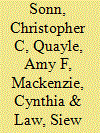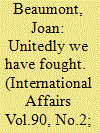|
|
|
Sort Order |
|
|
|
Items / Page
|
|
|
|
|
|
|
| Srl | Item |
| 1 |
ID:
133832


|
|
|
|
|
| Publication |
2014.
|
| Summary/Abstract |
From 2010 to 2012 a diverse group of young people participated in an oral history theatre project, Chronicles, which aimed to support them to claim a personally meaningful Australian identity. Oral history theatre was used to facilitate a process whereby the young people were able to reconnect with their personal family histories, encounter Aboriginal young people and stories, and together interview Aboriginal Elders. Through this process, they could develop new understandings of their own social identities, and meanings of and possibilities for belonging. 'Centring diverse lives, decentring whiteness' and 'a different starting point: Aboriginal ways of knowing', were the two key outcomes that we report on. Bringing people from diverse cultural and social backgrounds together to share stories of history, culture and identity, offers a unique vantage point from which to rupture dominant narratives about belonging/non-belonging and show up whiteness, and together forge a new Australian identity reflective of everyday multiculturalism.
|
|
|
|
|
|
|
|
|
|
|
|
|
|
|
|
| 2 |
ID:
131432


|
|
|
|
|
| Publication |
2014.
|
| Summary/Abstract |
This article examines what motivated the dominions to make such a sustained and costly contribution to the war effort of the British empire during the First World War. With particular reference to Australia, it argues that imperial loyalty, now discounted as anachronistic, was the dominant ideology. Not only did it inspire the initial generous support for the British war effort but, for many Australians, the empire's cause invested with meaning the battle losses which were proportionately the highest of any dominion army. The Gallipoli campaign of 1915 is now celebrated as having given birth to the foundational narrative of the young Australian nation, but at the time this embryonic nationalism too was positioned within the framework of imperial loyalty. Moreover, with the conservative forces dominating federal politics after the divisive debates about conscription in 1916 and 1917, 'loyalty' became entrenched as the litmus test of political reliability. Hence, while Australia's Prime Minister W. M. (Billy) Hughes aggressively asserted the rights of the dominions to a new and more independent role within the imperial relationship in 1918 and 1919, this agenda for change found little support at home. It is therefore ahistorical to see the First World War as the birth of Australian nationalism in the sense that the term is understood today. Rather, imperial loyalty was affirmed by the British victory as the dominant ideology and proved able to accommodate the growing sense of national singularity that the war fuelled.
|
|
|
|
|
|
|
|
|
|
|
|
|
|
|
|
|
|
|
|
|